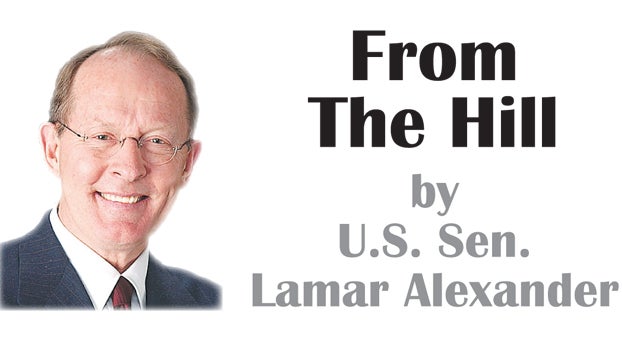Colleges, universities must return to school
Published 12:49 pm Tuesday, June 9, 2020
|
Getting your Trinity Audio player ready...
|
BY SEN. LAMAR ALEXANDER
As universities across the country prepare to open their doors to students this fall, it will be up to college administrators to decide how to do it safely.
I chaired a hearing this week in the Senate education committee with several college administrators, including Dr. Logan Hampton, president of Lane College in Jackson, to explore what universities are doing to achieve the goal of safely resuming in the new school year.
I was recently on a phone call with about 90 presidents of Tennessee’s 127 institutions of higher education, almost all of them are planning to resume in-person classes in the fall, and the one thing that was made clear was this: all roads back to college lead through testing.
The availability of widespread testing will allow colleges to track and isolate students who have the virus or have been exposed to it, so the rest of the student body doesn’t have to be quarantined.
Widespread testing not only helps contain the disease; it builds confidence that the campus is safe. Fortunately, Brett Giroir of the U.S. Department of Health and Human Services says there will be 40 to 50 million tests available per month by September. That is four to five times today’s number — and today’s number is twice as many as any other country.
The United States is home to 6,000 colleges and universities — arguably the best system of higher education in the world because institutions have maximum autonomy and minimum direction from Washington on everything from their curriculum, tuition, admission policies, health care plans for students and compensation for faculty.
They determine what their policies will be for student behavior and conduct, housing, safety and a host of other things.
We know that a single lost year of college can lead to a student not graduating from college and set back career goals. Already, disruption of university research projects has erased much of the progress that was being made with the record levels of research funding Congress has provided over the past five years.
Many American colleges will be permanently damaged or even have to close if they continue to be, as a witness at my hearing said, “ghost towns.”
Two thirds of college students want to return to campus, according to an Axios survey. At Purdue University, tuition deposits by incoming freshmen broke last year’s record.
Colleges and universities are micro cities. College presidents and administrators can make them among the safest small communities in which to live and work during this next year. In doing so, they will help our country take its surest step toward normalcy.
As chairman of the Senate education committee, I will continue to work to ensure the federal government is giving institutions of higher education across our country the tools they need to reopen safely in the fall.


